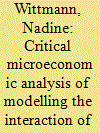|
|
|
Sort Order |
|
|
|
Items / Page
|
|
|
|
|
|
|
| Srl | Item |
| 1 |
ID:
124693


|
|
|
|
|
| Publication |
2013.
|
| Summary/Abstract |
This paper presents an alternative approach to a graphical analysis of the interaction of White Certificates with the EU emission trading scheme as the approach of Sorrell et al. (2009a contains the following aspects that require some clarification: first, the issue of a clearer distinction between conventional and alternative energy supply is brought up. Second, the concept of a minimum requirement for energy demanded is discussed. Third, the correlation between demand for energy and demand for energy efficiency measures is displayed in a more intuitive manner. The effects of introducing WCTS and EU ETS into the market setting are then analyzed accordingly.
|
|
|
|
|
|
|
|
|
|
|
|
|
|
|
|
| 2 |
ID:
094293


|
|
|
|
|
| Publication |
2010.
|
| Summary/Abstract |
A number of Member States of the European Union (EU) have introduced market-based policy portfolios based on quantified energy savings obligations on energy distributors or suppliers, possibly coupled with certification of project-based energy savings (via white certificates), and the option to trade the certificates or obligations. The paper provides an up-to-date review and analysis of results to date of white certificate schemes in the EU.
In the EU supplier obligations and white certificate schemes have delivered larger savings than originally expected with obliged companies exceeding targets and, in some cases, at cost below what policy makers have anticipated. Supplier obligations foster the uptake of standardised energy efficiency actions often targeting smaller energy users (residential sector), lowering the transaction costs and contributing to market transformation. The role of certificate trading is more ambiguous. Trading can bring benefits where the target is set sufficiently high with respect to the energy-saving potential in the sectors covered. Theoretically trading may be better suited for broader systems with comprehensive coverage, but even in smaller schemes trading may reduce the transaction costs of compliance for obliged actors without sufficient expertise on end-use energy efficiency. Yet, trading increases the administrative cost ratio of energy-saving obligations.
|
|
|
|
|
|
|
|
|
|
|
|
|
|
|
|
| 3 |
ID:
176838


|
|
|
|
|
| Summary/Abstract |
As one of many EU Member States, Poland introduced an Energy Efficiency Obligation (EEO) in 2012 to deliver its energy efficiency targets under Article 7 of the EU's Energy Efficiency Directive. The Polish EEO includes White Certificate trading as a key element making it one of the few EEOs in the world that include this feature. For the first time since its inception, this paper provides a systematic evaluation of the Polish EEO.
|
|
|
|
|
|
|
|
|
|
|
|
|
|
|
|
| 4 |
ID:
125829


|
|
|
|
|
| Publication |
2013.
|
| Summary/Abstract |
Energy efficiency obligations (or white certificates) are increasingly used to reduce carbon emissions. While the energy efficiency obligations were originally intended as carbon reduction and not fuel poverty policies, due to recognition of the potential for regressive outcomes they often include provisions for vulnerable and low-income customers. Intuitively, reducing carbon emissions and alleviating fuel poverty seem to be two sides of the same coin. There are, however, considerable tensions between the two when addressed through energy efficiency obligations, particularly arising from the potentially regressive impacts of rising energy prices resulting from such obligations, but also the complexity of targeting fuel poor households and the implications for deliverability. Despite those tensions, the UK government decided to use energy efficiency obligations, the supplier obligation, as the main policy for reducing fuel poverty. In light of the proposals, this paper provides an analysis of the main tensions between carbon reduction and fuel poverty alleviation within energy efficiency obligations, outlines the fuel poverty provisions of the British Supplier Obligation, assesses its rules for identifying the fuel poor, and provides a critical analysis of the planned policy changes. Based on this analysis, alternative approaches to targeting fuel poverty within future supplier obligations are proposed.
|
|
|
|
|
|
|
|
|
|
|
|
|
|
|
|
| 5 |
ID:
127264


|
|
|
|
|
| Publication |
2014.
|
| Summary/Abstract |
The last decade has seen an increase in the importance of energy efficiency and the sustainable use of energy resources due to their significant benefits for reducing a country's dependence on foreign energy resources and increasing awareness on environmental problems. Turkey aims to reduce its energy intensity by 20% up to 2023, and in order to accomplish this target, the country plans to use energy more effectively in various industries and develop financial mechanisms for energy efficiency. Although much effort has been made to improve energy efficiency, additional policies such as marked-based incentives are still necessary. This article deals with one of the many market-based energy efficiency policies, called Tradable White Certificates (WhC) or Energy Efficiency Obligations. The current situation of the energy field in Turkey and energy consumption by industries is presented first in this paper, followed by potentials for energy efficiency in each industry and energy efficiency policies. Furthermore, the theory and applicability of a WhC System is introduced and discussed in terms of market conditions, choice of obligated participants and market mechanisms and barriers for the Turkish electricity and natural gas market to benefit from the residential and industrial energy savings potential.
|
|
|
|
|
|
|
|
|
|
|
|
|
|
|
|
|
|
|
|
|